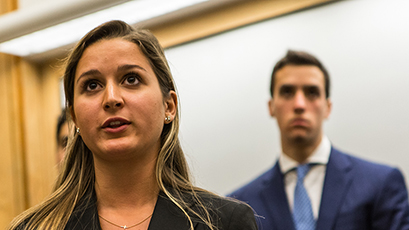“We want to help freshmen begin to think about the ways in which a country’s culture influences managers’ choices, and what it means to have integrity in a business setting,” said Ellen McPhillip, assistant dean for undergraduate business education. “We want students to understand that being culturally competent is an essential skill in the global economy. Thus, they need to be able to explore some of the issues that businesses are grappling with, ask good questions, and have a global mindset.”
The projects are part of the School’s required FIRST Step course, in which students must look at a cultural issue (e.g., the role of women in business), water management, or corruption and how these issues impact business in one of 16 countries. The course culminates with students making a formal presentation on their findings.
Nine students who studied corruption in China this spring semester produced a video as part of their presentation. They also explained what business executives must understand about Chinese culture. “Guanxi is about businesses cooperating with each other and supporting and respecting each other,” they observed.
They used real-life examples of situations confronted by Apple (human rights violations) and Samsung (child labor violations), then re-assured their “clients.” “You might all be worried now about doing business in China, but don’t be worried – we have solutions for you,” they promised.
Another group, calling themselves Mexiwater consultants, looked at the distribution of drinkable water to people in Mexico. They said the privatization of the water industry has allowed multinational corporations to put profit before the practicality of distributing water to rural residents. They recommended recruiting the World Bank to invest in the water sanitation and supply industry.
“We will figure out how to make the industry more profitable by determining where water is being lost to theft or miscalculations of water distribution,” they advised. “It will be effective.”
Another group tackled ways for Mary Kay Cosmetics to infiltrate India’s market and explained the need to travel there together to better understand the culture and promote the product accordingly. “We want you to have interactions with the culture, face to face with the Indian people,” the team told their “client.” “You will be able to know them -- what they think and what they want.”
Victoria Ricci, whose group looked at corruption in Brazil, found the experience of jumping straight into a group consulting project as a freshman challenging, but rewarding. After freshman Carolina Arango finished her presentation on women in India, she reflected on all she’d learned. “As a woman, the course has prepared me to realize obstacles that I will need to overcome in the business world.”

